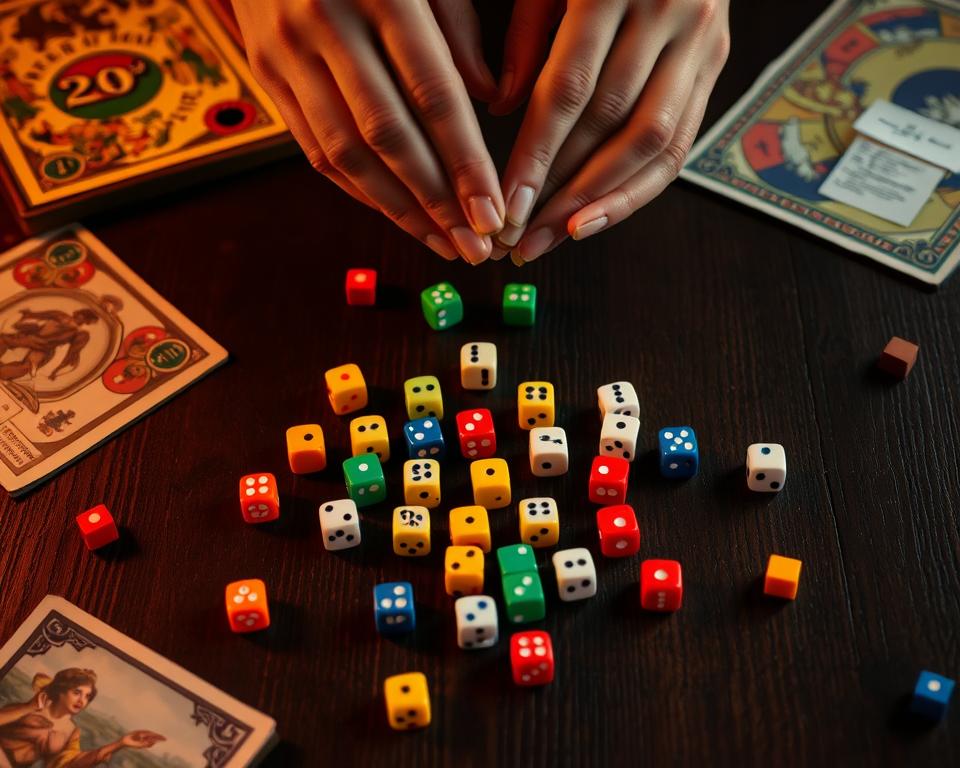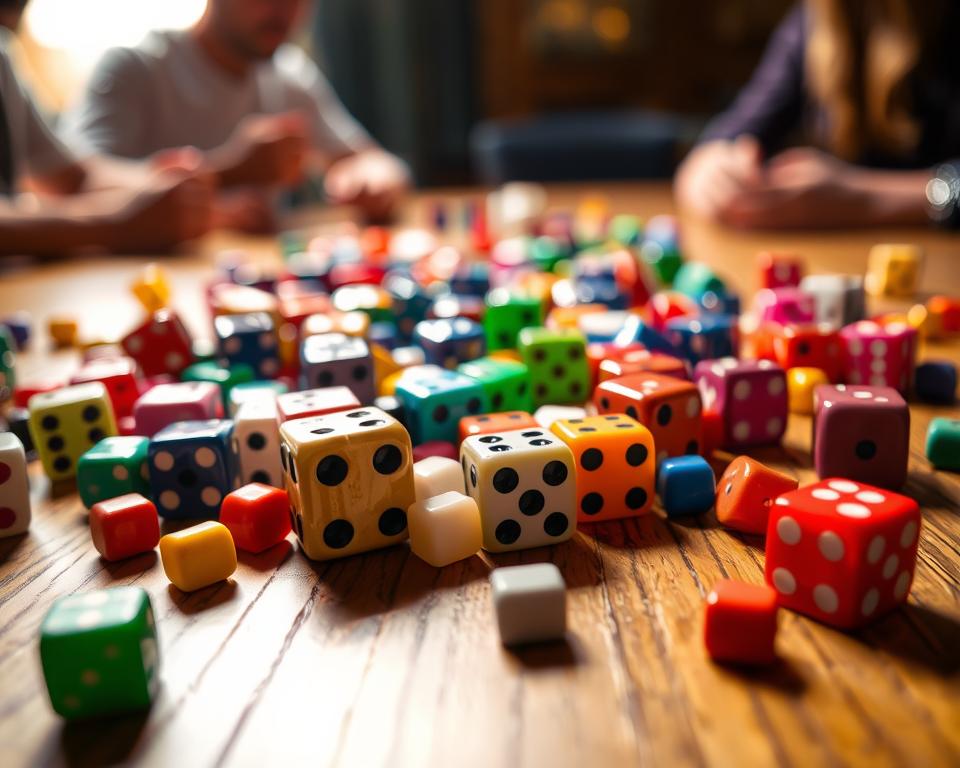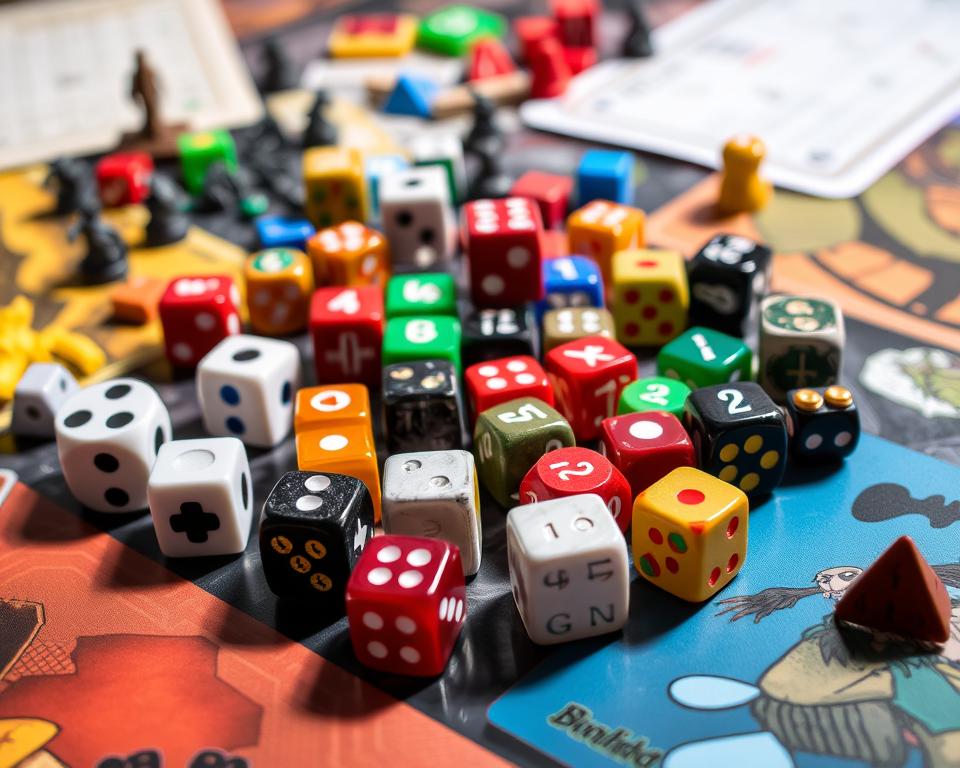
Dice games have been thrilling players for centuries. They mix luck, strategy, and social fun. This guide will cover the basics of dice games, from rules to advanced strategies. You’ll learn about the appeal of dice games, popular types, and how to play well.
Dice games start with the simple act of rolling dice. Whether you’re new or experienced, knowing how dice games work is key. This guide will teach you about the mechanics, from rolling dice to understanding the odds.
Dice games come in many forms, each with its own rules and history. From Craps to Yahtzee, this guide will show you the variety of games out there. You’ll learn about their origins and how they’re enjoyed worldwide.
Whether you’re a dice game expert or just starting, this guide has what you need. It will help you improve your game. Start your journey into the world of dice games, where luck and strategy meet.
Introduction to Dice Games
Dice games have fascinated people for centuries. They have a rich history and are loved all over the world. Let’s explore why these games are so timeless and learn about some of the most famous ones.
The Timeless Appeal of Dice Games
Dice games are loved by everyone, no matter where they’re from or how old they are. They’re simple, easy to play, and full of surprises. These games have been around since ancient times, used for fun, fortune-telling, and even to solve problems.
Today, dice games are still a big part of many cultures. They’re often at the heart of traditions and celebrations. The roll of the dice can bring people together and create unforgettable moments.
Overview of Popular Dice Games
- Craps: This is one of the most famous dice games. Players bet on the outcome of two dice rolled on a table.
- Yahtzee: A family favorite that mixes luck and skill. Players aim to score points by rolling certain dice combinations.
- Backgammon: A game of strategy and chance played by two people. It has ancient roots, dating back to Mesopotamia.
- Farkle: A quick and fun game where players roll dice to score points. It’s all about achieving the right combinations.
These are just a few examples of the many dice games enjoyed by people everywhere. Each game offers a unique mix of skill, strategy, and luck. This makes them beloved by gamers of all kinds.

Understanding Dice Notation
Learning the language of dice games is key to understanding their rules and strategies. A crucial concept is dice notation. It’s a standard way to show how many and what type of dice are used in a game.
Dice notation is written as “XdY.” Here, “X” is the number of dice, and “Y” is the number of sides on each die. For instance, “2d6” means two six-sided dice. On the other hand, “1d20” is a single twenty-sided die.
- The number “X” before the “d” shows how many dice there are.
- The number “Y” after the “d” tells us how many sides each die has.
- Rolls can be mixed, like “3d6 + 2d4.” This means rolling three six-sided dice and two four-sided dice.
“Understanding dice notation is the foundation for comprehending the rules and strategies of any dice game.”
By getting the hang of dice game terminology and common dice game terms, players can tackle the challenges of different dice games. This includes both classic games and new ones.

Fundamental Dice Game Rules
Dice games have basic rules that everyone needs to know. These rules help players enjoy the game and get better at it. Knowing how dice games work is key to having fun.
Setting up the Game
Before you start, you need to set up the game. This means figuring out how many players there are and what dice to use. You also need to decide what the game is about.
Some games might also have chips or tokens for players to use. This adds another layer to the game.
Taking Turns and Rolling Dice
- Who goes first is usually decided randomly or by a chosen player.
- Each player rolls the dice during their turn, following the game’s rules.
- The dice roll’s outcome helps players make choices, score points, or move forward in the game.
- Dice games mix luck and skill. Players need to use dice game rules and strategies to succeed.
Learning the basic how dice game works rules lets players dive into the exciting world of dice games. The dice roll can change everything in the game.
“The roll of the dice is arbitrary, but how you play the game is not.”
Probability in Dice Games
Exploring dice games means learning about probability. This knowledge is key to improving your game. It helps you make smart moves and win more often.
Basic Probability Concepts
Probability is about the chance of something happening. It’s important in dice games, whether it’s one die or many. Knowing the odds can help you win.
Take a simple six-sided die for example. Each side has a 1/6 chance of showing up when you roll it. This means each side has about a 16.67% chance. This info helps you plan your moves better.
But it’s not just about one die. When you roll more than one, things get more interesting. Learning about probability in dice games helps you understand the odds of different outcomes.
“Probability is not a mere computation, but a way of thinking.” – Nate Silver, author and statistician
By learning about probability, you’ll get better at dice games. You’ll know how to make the right choices. Let probability guide you to victory.
Dice Game Variations
Dice games go beyond simple luck. They include classic games that have lasted for ages and new twists that make them exciting again. Explore different cultures and eras to find new ways to enjoy dice games.
Classic Dice Games
Dice games have been around for thousands of years. They’ve captured hearts in ancient Egypt and modern casinos. Try Craps for a thrilling experience where dice can change the game instantly.
Yahtzee combines luck and strategy in a fun challenge. And Backgammon offers a unique mix of dice rolls and piece movement.
Modern Twists on Dice Games
Modern players have added new twists to classic games. Farkle adds a fun twist to scoring. Sic Bo brings ancient Chinese traditions to today’s excitement.
Roll for the Galaxy is a sci-fi game that mixes engine-building with dice rolls. It’s a game of strategy and luck.
“The roll of the dice is the ultimate expression of chance in a game. It’s the moment where skill and strategy intersect with the unpredictable twists of fate.”
Whether you’re new to dice games or a seasoned player, there’s something for everyone. Dive into the world of dice games for fun and challenge.
How Dice Game Works
Dice games have been thrilling players for centuries. They mix chance, strategy, and social fun. Understanding how they work reveals their timeless appeal.
The basic idea is simple: rolling dice to see what happens next. Each roll changes the game. This chance adds excitement and suspense.
But there’s more to it than luck. Players use strategies to win. They manage resources and make smart moves. This mix of luck and skill is what makes games exciting.
Dice games also bring people together. They’re about friendly competition and fun chats. Sharing the excitement of a roll can create a strong sense of community.
“The true magic of dice games lies in the perfect balance between chance and strategy, creating an experience that is both thrilling and intellectually engaging.”
Learning about dice games can deepen our appreciation for them. It’s about the thrill of the roll, the strategy, and the fun with friends. These elements make dice games enduring and fun.
Dice Game Strategies
Mastering dice game strategy is a mix of math, creativity, and being flexible. It doesn’t matter if you’re new or experienced. Knowing the ins and outs of strategy can make your games better and boost your winning chances.
Beginner Strategies
For new players, learning the basics of dice game probability is key. Start by understanding the odds of rolling different numbers on a single die. This knowledge helps you make smart choices and spot good opportunities.
- Try to reduce risks and increase your scoring chances.
- Keep an eye out for patterns and trends in the game.
- Be patient and disciplined, as dice games need strategy more than luck.
Advanced Tactics
With more experience, you can dive into more complex strategies. Learn to predict your opponents’ moves and improve your probability skills.
- Learn about probability in dice games and how it guides your decisions.
- Build a collection of dice game strategies for different situations.
- Watch your opponents’ moves and adjust your strategy.
- Try out different betting and risk-taking methods to win more.
“The key to winning at dice games is to approach them with a combination of strategic thinking and a willingness to adapt to the ever-changing dynamics of the game.”
By learning both beginner and advanced strategies, you’ll become a top player. You’ll enjoy these exciting games even more.
Origins and History of Dice Games
Dice games have been around since the beginning of civilization. They have always held a special place in cultures, crossing over time and space. From ancient Mesopotamia and Egypt to the gaming traditions of Greece and Rome, dice games have been a big part of our history.
The first dice were used for religious rituals and divination. They were made from bone or stone. These early dice helped people seek guidance, make big decisions, and solve disputes. As time went on, dice games became a fun way to spend time and connect with others.
As civilizations grew, so did their dice games. The Egyptians played Senet, a game where you moved pieces based on dice rolls. The Greeks and Romans also had their own dice games, some of which are similar to games we play today, like backgammon.
“Dice games have been a part of human culture for millennia, reflecting our innate desire for chance, competition, and social interaction.”
Dice games were more than just fun. They were linked to religion, politics, and social status in many cultures. The results of dice rolls were seen as signs from the gods. Being good at dice was thought to show divine favor or leadership.
Today, dice games still attract players worldwide. They offer a mix of luck and strategy, keeping the spirit of chance and competition alive.
Famous Dice Games Around the World
Dice games have long fascinated players worldwide. Each culture has its own special dice game, filled with history and meaning. From ancient Asia to Europe’s lively streets, these games are part of our shared history.
Cultural Significance of Dice Games
Dice games are more than just fun. They show off cultural values and social norms. In some places, they help make decisions or settle disputes. In others, they bring people together, building strong bonds.
In ancient China, Xiangqi, or “Chinese chess,” uses dice for chance and strategy. In India, Pachisi, or “Ludo,” brings families and friends together in friendly competition.
“Dice games have the power to transcend borders, uniting people from all walks of life in a shared experience of chance and camaraderie.”
The Mexican Lotería and Backgammon from the Middle East are just a few examples. These games are key parts of their cultures, symbolizing tradition and community.
Exploring dice games shows us a rich tapestry of human experiences. These games captivate and inspire, connecting people across generations and continents.
Dice Game Etiquette
Playing dice games is more than just knowing the rules. It’s also about understanding the unwritten rules and social norms. This knowledge helps you be a good sport and a respected player. It ensures everyone has a good time.
Being considerate of others is key. This means:
- Avoiding loud noises that might distract others
- Not touching other players’ dice without asking
- Respecting everyone’s personal space
- Staying calm, even when you lose
Good sportsmanship is also important. This includes:
- Celebrating others’ wins with real excitement
- Supporting all players, no matter their skill
- Dealing with losses well and not being a sore loser
- Winning graciously and not showing off too much
“The true mark of a seasoned dice game player is not the size of their winnings, but the respect they earn from their peers through their conduct and character.”
By following the etiquette of dice games, you make the game more fun for everyone. You also become known as a considerate and respected member of the gaming community.
Dice Game Terminology
Dive into the world of dice games and learn the key terms. Knowing these terms will help you talk and play with the dice game community.
Common Dice Game Terms Explained
It’s important to know dice game terminology whether you’re new or experienced. Let’s look at some common common dice game terms:
- Roll – The action of throwing the dice and seeing the numbers or faces.
- Pip – The dots or markings on a die’s face.
- Combo – A special dice roll combination that matters in a game.
- Craps – A well-known dice game where players bet on roll outcomes.
- Yahtzee – A classic game where players aim for specific scores.
- Farkle – A game where players risk points by rolling, losing all if they “farkle” (fail to score).
“Mastering the language of dice games will help you navigate the rules and strategies with ease.”
Knowing these common dice game terms will help you join the dice game community. It lets you dive into the exciting world of these games.
Dice Game Equipment
Having the right equipment is key for fun and engaging dice games. From the dice to gaming accessories, the tools matter a lot. Let’s look at the essential equipment every player should know.
The Dice
Dice are at the center of any game. They’re small cubes with numbers 1 to 6 on each side. Most games use a standard six-sided die. But, there are also dice with more sides, like four, eight, and twenty.
Dice Trays and Cups
Dice trays and cups help games roll fairly. They keep dice from rolling away. Trays have edges or textures to hold dice, while cups are more closed.
Scoring and Record-keeping
Some games need extra tools for scoring. You might use score sheets, pencils, or apps. Keeping track of your game is crucial.
The dice game equipment you pick can change your game’s fun and fairness. Explore and choose the best tools for you.
“The right tools can make all the difference in a game of chance.” – Dice Game Enthusiast
Conclusion
This guide has taken you on a journey through the world of dice games. You’ve learned how they work, the strategies, and their cultural importance. You now know the basics and the deeper concepts that make these games exciting.
Whether you’re new or experienced, you have the tools to enjoy different dice games. You can appreciate their history and start your own adventure. Dice games have been loved for many years, and now you can join in.
Keep exploring and remember the importance of good sportsmanship. Learn the key terms and get the right equipment. With the strategies from this guide, you’ll improve your game. Enjoy the thrill of rolling the dice, whether for fun or competition.






